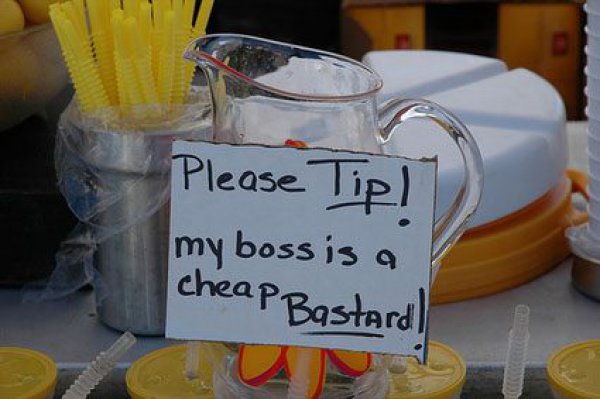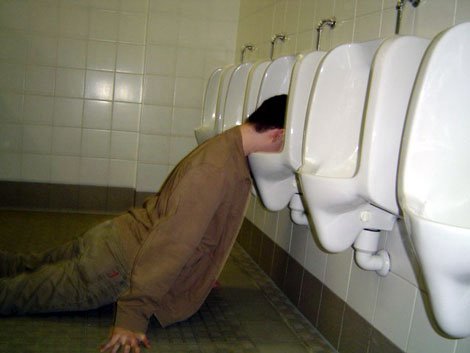There comes a time in every bartenders career when you are forced to give a guest the ole Heave-ho! Cutting a customer off who has reached their limit is always a stressful experience. In the last thirty years, I have seen just about every incarnation of those who have failed to drink responsibly- from the happy drunk, the talkative drunk, the flirty drunk, the loud drunk, the sleepy drunk, the verbally abusive drunk and the most feared of all… the violent drunk.
It forever amazes me that bartenders who actively over-serve their guests, become indignant when the guest behaves poorly. Worse is the bartender who treats their inebriated source of income with distain or actively embarrasses them while kicking them out the door. If you truly embrace the philosophy that the customer should be treated like a guest in your own home, what kind of jerk ridicules a house guest, takes their money and then yells at them to “…get the hell out and don’t come back!”
Make no mistake, if someone becomes verbally or physically abusive to you or your fellow staff, all bets are off. Just like a drunk behind the wheel of a car, they must ultimately take responsibility for their actions. However, the bartender must never forget that we have both an ethical and legal responsibility to make sure that the guest leave the establishment in a relatively sober state of mind.
Here are some tips that I have gathered over the years for cutting a guest off:
1) DIVIDE AND CONQUOR- Not all bartenders have the luxury of having a manager on duty throughout their shift. However, if you have one in the house, take advantage. It is a sign of strength to ask for help, plus it is actually the managers job to deal with guest issues. They may give you grief at a later time if they feel you over served, but a good manager will discreetly isolate the guest, have them pay their check and get them to leave without embarrassing them or drawing attention to the other guests.
The object is to get a drunk to step away from the bar where the manager can chat with them in relative privacy. A good bartender will brief a manager on an unruly guest and then act as a distraction to the other guests so as not to draw attention.
2) KILL THEM WITH (GUINUINE) KINDNESS- The key to handling any drunk is to AVOID confrontation. When cutting someone off, rather than bluntly point our that they are drunk, chum up to them by DISCREETLY asking them if they would like a cup of coffee on the house. Most drunks instantly sober up at this question. It is a universally accepted, non-confrontational, accusation. They will often ask you directly (in shhh-hushed tones) if they are acting a little drunk. The best response is to GUINUINELY smile, lean in close and whisper right back that they are fine, but that you are looking out for them and just want to make sure that they get home safe.
With out accusing them of anything, they will almost always infer that they are drunk and that it’s time for them to go home. All you did was be hospitable and offer them a hot cup of Joe. If you ask in a sarcastic or irritated tone, be prepared for a snarky retort that can quickly escalate. GUINUNE kindness is the key (even if you’re seething on the inside). Many bartenders are stirring for a confrontation when a guest is being an ass… if so, they are in the wrong business.
3) HYDRATION IS THE KEY- If an intoxicated guest orders another round and you don’t feel comfortable serving them… don’t. It is actually the law. No manager or owner can fire a bartender for refusing to over-serve a guest. Still, if you are in that predicament, some diplomacy is still called for. If a manager green lights another round, a bartender should make the drink and serve it to the manager with a tray and POLITELY request that they serve it to the guest. Good managers will always trust the bartenders opinion, a bad manager will think twice about asking you in the future when the guest they serve staggers out the door and they realize that they just assumed the liability.
If you can’t 86 a guest or they just aren’t getting the hint, take their order and serve them a glass of water instead. Water DOES NOT make you sober faster, it just buys you time. When the guest inevitably asks “what’s this?” Lean in and, with a friendly demeanor, tell them that they looked thirsty and you just wanted to make sure they feel as good in the morning as they do right now. Again, presenting yourself as the good guy who is simply looking out for their best interest. Most, drunks will thank you outright and even shake your hand. More often than not, they never get around to buying that last drink and in rare cases, they will wait enough time that your feel comfortable serving them one more. Serving a guest water is a hint, not a statement or an accusation. Non confrontation is the key.
4) NEVER TOUCH A GUEST- Ever! In all my years as a bartender, I only once physically manhandled a guest out the door. Two guests had gotten into an escalating yelling match when I interceded and separated them. I made eye contact with the lesser drunk and he quickly understood to sit back down and that I would take care of the problem. I then politely escorted the first back to his table on the other side of the bar and in a calm reassuring voice suggested that he should let the incident go, stay on this side of the bar and enjoy the evening with his friends. As got back behind the bar, I could see him making animated gestures from his seat when he suddenly stood up and marched back towards his nemesis. Without hesitating I jumped over the bar and locked his arms behind his back before he could blindside the other guest. I marched him to the door (with the manager and other bartenders in tow) and once outside, we collectively 86’d him for life.
Even though that incident worked out for the best, I made three critical mistakes in that scenario, any one of which could have cost me or the bar the liquor license, a major lawsuit or worse. First, I should have informed a manager and cut him off at the first signs of aggression. Second, I unleashed an angry drunk upon the city. He may have gotten behind the wheel of a car, picked a fight in a neighboring bar or gotten a weapon and come back to finish what he started. The third and most dangerous of all was that I physically laid hands on the man. If he woke up the next day with a sore neck, he could easily have sued and won. A good lawyer would have blamed me for over serving and then crippling his client. Juries are not often sympathetic to drunks unless they feel that the establishment was negligent to begin with.
In the many years since that night, I have had plenty of aggressive drunks pass through wherever I happened to be working. Yet, since that day, I never touched a guest without their permission and I have never had an argument blow up into a full blown fist fight. Many bartenders reading this might well say that I have been lucky and that these things happen beyond the bartenders control. I suggest to them, that there was absolutely no luck involved. I was prepared, alert, anticipated trouble and took active steps to diffuse situations before they escalated out of control.
5) WHEN ALL ELSE FAILS- CALL THE COPS! It really is the last resort… but that does not mean that you wait until an incident has happened before calling the fuzz. It is far, far better to call the boys in blue and then calm a situation down than to have a fight break out and by the time the police arrive. the offenders are long gone or you need to make a second call for an ambulance. If you announce the police have been called people tend to calm down pretty quick. If the incident abates and the police show up… thank them kindly and offer to buy them a drink when their off duty.
Unless a situation has spiraled completely out of control, try to meet the cops at your doorstep so that you can brief them on the good guys vs. the bad guys and then ask them to segregate offender if possible. No bar owner wants their patrons escorted out of thier bar in handcuffs. The police are professionals, but they are NOT in the customer service industry. Most drunks sober up pretty fast when the police walk in, but those that don’t usually find themselves waking up in the drunk tank.
6) DON’T OVERSERVE TO BEGIN WITH- Often a guest will walk into an establishment having already tied 2 or 5 on. Every time a guest requests a drink (whether you’ve served them previously or not) the smart bartender is looking for the tell tale signs that the guest needs to take a break. Are their eyes glassy? Their speech slurred? Are they overly loud or animated? If you decide they’ve had enough, don’t second guess yourself and don’t serve them one more and tell them that it’s the last one.
I once had a stranger walk into my bar and order a scotch and soda. He seemed perfectly sober to me until I put the drink in front of him. He asked where the bathroom was and suddenly his speech was remarkably slurred and he was wobbling. I immediately removed his untouched drink and directed him to the bathroom. He staggered off the barstool, walked in completely the opposite direction and when he couldn’t figure out how to push open the front door that needed to be pulled open, he rested his head on the wall and peed right there on the floor.
I ran over to open the door for him and as he pushed at the now open door one more time, he staggered forward, fell down and cut his head open on the curb. As a former EMT, I called 911 and stayed with him till the ambulance and police arrived. I was worried the police would be a little skeptical of my version of events. However, another guest had witnessed the entire event and repeated the same version. Had he had even one sip from the drink I served, I would have been personally liable for his fall and the bar owner could have been successfully sued. Lesson learned!
7) ELIMINATE BUYBACKS- “Wha-what!!” Says every pub bartender reading this. “But that’s my bread and butter!”. Right… it is. If you are a lazy or apathetic bartender. The practice of buying a third drink for a guest who has purchased two is remarkably unintelligent. I’ve worked in beer pubs, high volume tourist traps, stuffy hotel bars and ultra fine dining. Any bartender who argues that buybacks are essential to “keeping his regulars happy” may be right, but at what cost?
Any bar owner that supports buybacks is a plain flat outright idiot. Buybacks are terrible for three reasons. One, if you buy every third drink for a guest, you are literally GIVING away 33% of your inventory… for free!! The ONLY person who MIGHT see a return on that investment is the bartender, IF the drunk patron remembers to tip on top of the base check.
Two, if you offer excellent customer service and great quality drinks… the people will come. You don’t want the penny pinching drunks who come exclusively to your bar because they know they can get hammered for cheap. It’s a lose-lose scenario. Not to mention it drives away the good paying customers who are repulsed at the riff-raff stinking up the joint.
Three and most important… you are encouraging people to drink beyond their means. Everyone likes a bargain, but if I’m on the cusp of my drinking limit and you tell me that I can get two more drinks for the price of one… SERIOUSLY?
BTW, to my bartender brethren. Buybacks are essentially stealing. Even if the manager allows it, I bet the owner doesn’t. And the few stupid owner who do, you are not only taking advantage of their incompetence, you are endangering your own your livelihood, the owners bar and the life of your guest. Most states have outlawed such idiotic practices. My advice, instead of being a bad lazy bartender who must rely getting your guests drunk for your tips, try making a better drink or offering better service. Yes, that does mean your job will be a little harder, but way more satisfying.
The “regulars” you lose will be those losers your can’t stand anyhow and the quality of your tips will actually be much higher. Plus, you can sleep at night with a sense of professional pride. Good bartenders do things right and refuse to cut corners. Sometimes that goes unrewarded, but you know as well as I, that for every cheap drunk there is a generous one. The bad bartenders try to pick and choose the good ones don’t have too.
Agree? Disagree? Share your drunk stories with me and I may use your story in a future book. Know your limits and DRINK RESPONSIBLY!!



